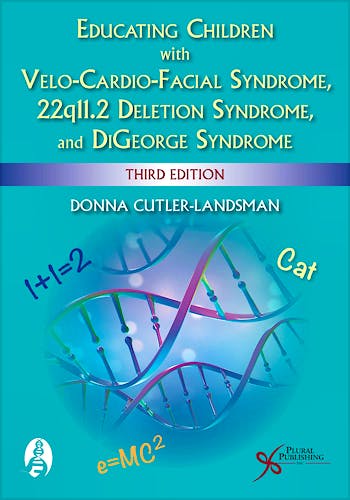

No hay productos en el carrito



Educating Children with Velo-Cardio-Facial Syndrome, 22q11.2 Deletion Syndrome, and DiGeorge Syndrome
Cutler-Landsman, D.
3ª Edición Febrero 2020
Inglés
Tapa blanda
387 pags
700 gr
18 x 26 x 2 cm
ISBN 9781635501674
Editorial Plural Publishing Inc
LIBRO IMPRESO
-5%
71,80 €68,21 €IVA incluido
69,04 €65,59 €IVA no incluido
Recíbelo en un plazo de
2 - 3 semanas
The 22q11.2 deletion syndrome, also known as velo-cardio-facial syndrome and DiGeorge syndrome, is relatively new. The genetic test to determine if a child has it has only been available since 1994. Educating Children with Velo-Cardio-Facial Syndrome, 22q11.2 Deletion Syndrome, and DiGeorge Syndrome, Third Edition, effectively blends the thoughtful research that has transpired within the past 25 years with practical and current educational strategies to better meet the needs of children with the 22q11.2 deletion syndrome and other developmental disabilities. With its expanded content, as well as new contributions from some of the most highly regarded experts in the field, Educating Children with Velo-Cardio-Facial Syndrome, 22q11.2 Deletion Syndrome, and DiGeorge Syndrome, Third Edition is an essential resource for teachers, parents, physicians, and therapists of children with this complicated learning profile.
To first address the scientific information that is needed to understand the syndrome and the implications of current research, expert contributors present the results of current studies involving brain abnormalities, language/learning profiles, medical needs, and psychiatric and behavioral difficulties. These valuable chapters are written in a reader-friendly manner to help parents, professionals, and teachers gain useful and necessary comprehension of the unique characteristics of the 22q11.2DS population.
The second part of the book is a practical guide to educating a child with 22q11.2DS from birth through adulthood. Divided into the various stages of development from preschool to adulthood, it includes information regarding the necessary tests special education teams should run, typical difficulties associated with learning, changes that occur with ability as the child matures, and behavioral problems in the school setting.
- Addition of recent research studies since 2012
- Current research and treatment options for mental health issues
- Expanded and enhanced coverage of bullying and the social/emotional aspects of the syndrome
- Discussion on the possibility of cognitive decline and how to address this at school
- More information on Common Core State Standards and standardized testing for children with disabilities, including a section on understanding test scores
- Homeschooling and other placement alternatives
- Executive functioning deficits, their impact in the classroom, and approaches to use
- Dealing with problem behaviors such as withdrawal and school refusal
- Cognitive remediation and new treatment strategies
- New math and reading remediation techniques
- New options for programming and post-secondary placements
Reviews of the Previous Edition
"As a parent and an occupational therapist, I recommend this resource about a rare condition that may require occupational therapy input for physical, cognitive, and possibly psychiatric reasons. The book has two parts: The first is scientific studies, and the second is educational interventions and evaluation of effective practices. Functional insights are specified from birth to adulthood. ...The editor is both a mother and a teacher with 38 years of experience. As an American, she provides extensive American resources as well as valuable contact information for centers of excellence in six other countries. I recommend this book for educators and for occupational therapists who work in mental health, pediatrics, and schools. As a parent of a child with this condition, I found it helpful and other parents may as well."
—Jude A. Driscoll, OT Reg. (PEI), Registered Occupational Therapist, TRE Facilitator Level I and II, in the Canadian Journal of Occupational Therapy (2013)
"This book had the ambitious goal of education the public and professionals about this syndrome and improving the lives of those affected by it. It is no mean feat that [largely] it succeeds. The first part provides an overview of the condition; the second focuses on classroom interventions. Recognized experts in the field write the background chapters...The second section on educational interventions is very practice and provides a wealth of advice that would benefit parents, educational staff and SLTs. The author is often at pains to point out the lack of evidence for advocated interventions in this condition but extrapolates from other related fields to make reasonable suggestions...[T]his remains a valuable resource."
—Anny Mayne, Specialist SLT, North Thames Regional Cleft Lip and Palate Service, in the Royal College of Speech and Language Therapists Bulletin (July 2013)
Donna Cutler-Landsman, MS, is an educator with a master’s degree in counseling psychology who has spent over 35 years in the classroom teaching children in grades five through eight, and as an advisor to the gifted and talented program in the Middleton Cross Plains Area School District in Wisconsin. In addition, she served as a cooperating teacher with the School of Education, University of Wisconsin-Madison for 15 years. Donna currently offers targeted special education advocacy for children with complex medical learning needs through her company Cutler-Landsman Consulting, LLC. She is a past president of the VCFS Educational Foundation, serves on the 22q International Foundation board, and consults for the 22q Family Foundation and the VCFS Virtual Center. She is a popular speaker and advocate on issues related to the 22q11.2 deletion syndrome and education throughout the United States and abroad.
© 2025 Axón Librería S.L.
2.149.0